Aims & Objectives
“Developing capacities together: European CSO-university networks for global learning on migration, security and sustainable development in an interdependent world” (InterCap) is a 3-year project (from Nov. 2017 to Oct. 2020) funded by EuropeAid envisaging to address the emerging concern on the way in which shifting public perceptions of (in) security and risk, influence understanding of migration, sustainable development, roles, responsibilities and lifestyles of EU citizens in an interdependent world.
In this direction, InterCap brings together 13 organizations from 12 different EU countries specialized in teachers’ training, educational reform, sustainable development and migration issues, along with more than 40 associates from all over EU (local authorities, Ministries, Universities, and CSOs). The Action’s priority is to establish European CSOs-university networks, to build the capacities of the education actors, to promote global learning on migration, security and sustainable development in an interdependent world.
The project aims to enhance critical understanding of migration and sustainable development, in the context of SDGs, amongst those in teacher education, in order to increase comprehension of the relationship between the interdependent world, (in)-security and risk.
More specifically, by the end of the project, the InterCap partners are committed to:
- Ensure coherence and consistency in the delivery of development education on migration, sustainable development, and the interdependencies across local and global contexts.
- Enhance development education competencies amongst CSOs’ and University teacher trainers.
- Increase the availability of quality content and critical development education pedagogies in teacher training.
InterCap seeks to explore and strengthen the link between quality development education and attitudes towards migration and development, building on evidence-based practices, taking forward good cases and programs and establishing synergies.
The project will draw experience and knowledge from the following participatory educational methods:
- Philosophy for Children (P4C), focused on thinking, reasoning and questioning, also focus on Global Citizenship);
- Open Spaces for Dialogue and Enquiry (OSDE), referring to the creation of open safe spaces for critical thinking and discussion about global issues; and
- Theatre for Living (T4L), drama and theatre as agents of social change.
Methodology
The project delivers a non-formal, development education and global learning programme that caters to teacher trainers and teachers’ interests, needs and availability and enables them to progressively engage with development through various “stages” of participation. The methodologies to be used for the engagement of stakeholders are:
- Learner-centred methodology: Global learning methods and interactive, participatory and experiential activities shall be used. The overall methodological approach will be based on the constructivist paradigm, which puts the learner (teachers’ trainers and teachers) at the centre of the learning process in order to mutually develop new knowledge.
- Inclusive and Collaborative Approach: Through the networks to be established, major stakeholders will have direct inputs in the InterCap development and implementation for the smooth integration of the main outcomes in the normal activities of the stakeholders.
- Dialogue Oriented Approach: Through the use of online communication tools, and regular meetings, the outputs will be constantly informed and adapted to all groups’ expectations and needs.
- Experiential/Authentic Learning: Teachers’ Trainers and teachers by taking part in the project oriented and placement activities will allow them to explore, discuss, and meaningfully construct concepts and relationships in contexts that involve real-world problems.
- Peer to Peer Support: The methodological framework foresees a peer education approach within both the teachers’ trainers and the teachers to engage them in new initiatives, support their learning process and raise awareness on specific themes.
- Needs Oriented Approach: The attitude and interests of target groups will be identified and taken into full consideration during the development phase.
- Participatory Education Methods: We will deploy the following innovative enquiry and participatory teaching methods and experiential methodologies: (1) Philosophy for Children (P4C); (2) Open Spaces for Dialogue and Enquiry (OSDE); (3) Theatre for Living (T4L).
Partners
- CARDET (Cyprus)
- Oxfam Italia Intercultura (Italy)
- Diversity Development Group (Lithuania)
- University of Split (Croatia)
- Istituto per la Cooperazione Universitaria Onlus (Italy)
- Family and Childcare Centre [KMOP] (Greece)
- Kopin (Malta)
- Liverpool World Centre (UK)
- Anti-discrimination Education Association (Poland)
- Euro-training (Bulgaria)
- World University Service Austria
- World University Service Germany
- Institute for Global Education and Projects Development (Slovenia)
-

CARDET (Cyprus)
CARDET is one of the leading research and training centers in the eastern Mediterranean region with global expertise in project design and implementation, project management, training and e-learning. CARDET has completed numerous projects relating to the development of adult and vocational training initiatives in the areas of social work, innovation and entrepreneurship. Members of its team and board represent European and International Higher education institutions, training centers and international organizations, and have in-depth knowledge of the adult training sector and financial literacy area while CARDET focuses in the promotion of social justice and social progress.
Visit website -

Oxfam Italia Intercultura (Italy)
Oxfam Italia is part of an international confederation of 20 organizations specializing in humanitarian aid and development projects, working together with partners and local communities in more than 90 countries. Around the globe, Oxfam works to find practical, innovative ways for people to lift themselves out of poverty and thrive. As Oxfam Italia Intercultura we work in global citizenship education with schools, teachers and students, intercultural education in particular to help the integration of students with a migrant background at school, integration of migrant population and refugees and asylum seekers receptions.
Visit website -

Diversity Development Group (Lithuania)
Founded in 2012, NGO Diversity Development Group is a non-profit organisation with an objective to carry out social (scientific, applied, and infrastructural) projects and research in the field of human rights, education, equal opportunities, diversity, migration and integration. Our strategic aim is to improve and manage diversity towards a sustainable, tolerant and socially responsible society through informing and educating the society about the various minority groups; actively participating in the development and implementation of social policies to ensure the protection of vulnerable groups in the society; creating and developing mechanisms for intersectional cooperation; and raising awareness about human trafficking in contemporary societies.
Visit website -
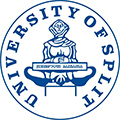
University of Split (Croatia)
Officially established in 1974, the University of Split is the second largest University in Croatia: there are about 24,000 students enrolled in the University’s undergraduate, graduate and post-graduate programs. As a predominant scientific and teaching public institution in the region, the University has expanded during the course of the past 30 years to include eleven Faculties, one Academy of Arts, four University Departments and University Library. Faculty of Humanities and Social Sciences, as a part of University, has ten Departments, strong research attitude and international cooperation but also with cooperation and care for local community.
Visit website -
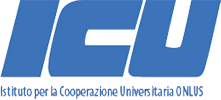
Istituto per la Cooperazione Universitaria Onlus (Italy)
The Institute for the University Co-operation (ICU) is an Italian NGO working in development co-operation since 1966. Our aim is to encourage a widespread adoption of culture and science at the service of human development. Training and formation constitute the core of our activities, and we struggle to foster an international cooperation culture in all the milieus where we operate. ICU's mission is to promote self-development in order to assure beneficiaries' positive impact on their communities. Our main areas of intervention include: Education and Professional Training; Hygiene and Sanitation; Rural Development; Women Rights Promotion; Renewable Energy; Emergency; Social Development.
Visit website -
![Family and Childcare Centre [KMOP] (Greece)](/images/logo/logo%20kmop.png)
Family and Childcare Centre [KMOP] (Greece)
KMOP is one of the oldest Greek NGOs with 40 years of accumulated experience in the provision of services to disadvantaged groups. KMOP’s objectives include: stimulating the integration and active participation of disadvantaged groups; combating social exclusion and promoting social cohesion and equality; enhancing the wellbeing of vulnerable groups in a sustainable manner by strengthening their capacities and increasing their access to resources; and raising awareness on social policy issues. KMOP is actively involved in both national and EU/international projects addressing social issues particularly focusing on low-skilled youth and long-term unemployed, victims of violence/trafficking, disabled, elderly, migrants and minorities.
Visit website -
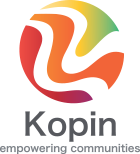
Kopin (Malta)
Kopin (VO/0200) works for human rights and children’s rights with the aim to empower its beneficiaries as key agents for social change and advancement. It is a hybrid, operating in three interconnected fields: international sustainable development cooperation, refugee support and global education. Set up in 2000, it is one of the few professional NGOs working in the human rights field as well as one of the main providers of Development Education in Malta.
Kopin envisions an equitable, diverse and sustainable society, where everyone is empowered to take care of our planet and its people. Kopin’s mission is to empower diverse communities in reaching their full potential, making informed choices and engaging in concrete actions in order to achieve global social justice together.
Visit website -
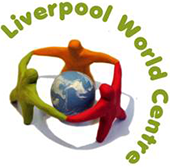
Liverpool World Centre (UK)
Liverpool World Centre (LWC) exists to make world issues relevant to the lives of young people. School is a crucial part of a young person’s life, therefore LWC works with children and teachers to facilitate understanding of global issues and promote social change. LWC uses topics such as Fairtrade, climate change, and citizenship to explore the relationships of young people with each other and those in the wider world. Such topics have been pulled together within the term “Global Learning”, and LWC has developed expertise and resources for schools in this area.
Visit website -

Anti-discrimination Education Association (Poland)
The Anti-discrimination Education Association (TEA) was founded in 2009 by persons involved in anti-discrimination education. The mission of the Association is to develop and disseminate anti-discrimination education so that each person is participating in the creation of a world free of discrimination and violence. The activities of TEA are directed to those individuals and institutions engaged in formal and non-formal education in Poland. We create solutions for teachers; educational institutions - Ministries responsible for education and science; education superintendents, teacher training centers; trainers of adults and youth; institutions involved in non-formal education.
Visit website -

Euro-training (Bulgaria)
"EURO-training" is a nonprofit making and non-governmental organization, founded in 2004 and located in Stara Zagora, Bulgaria. We promote and support various training activities in order to improve civic and social skills and competences based on blended and e-learning. We strongly believe that only well-educated and trained people are capable to make a transition to the knowledge-based economy and thus significantly improve the quality of life. Most of the EURO-training`s activities aim at empowering disadvantaged groups with appropriate knowledge and skills for successful placement in the labor market and this way contributing to their social inclusion.
Visit website -

World University Service Austria
World University Service (WUS) Austria is a politically independent, non-governmental organization committed to the promotion of the right to quality education on the basis of academic freedom and university autonomy. Since its establishment in Graz in 1983, WUS Austria has been working on the promotion of this aim all over the world. WUS Austria has positioned itself as an important operative partner for enhancing knowledge transfer and comparability in Higher Education between EU and non-EU countries. We provide operative and technical support and consultancy for a faster, more efficient implementation of the Bologna system and global trends in Higher Education.
Visit website -

World University Service Germany
W - as in world
The World University Service (WUS) is an international non-governmental organization which is politically and denominationally neutral. Since 1920 the WUS supports students and academics in higher education.U - as in university
The core issues of WUS Germany are higher education and defending human rights, especially the human right to education. WUS provides seminars, trainings, publications and information relating to the Sustainable Development Goal).S - as in service
Visit website
WUS Germany takes part in national and international campaigns in the educational and development cooperation sector, offers consulting and carries out scholarship programs and projects. -
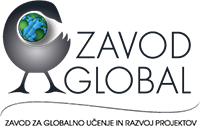
Institute for Global Education and Projects Development (Slovenia)
The Institute for Global Learning and Projects Development (Zavod Global) was established in Ljubljana, Slovenia in 2010 to address issues of global learning, intercultural education, migration and development. The Institute’s role is to attempt to provide a Southern Perspective to issues dealt with in the field of global learning. Its purpose is to bring together people in Slovenia/Europe with people in the Global South, especially Africa. Since its inception, the Institute has successfully implemented 40+ projects in the fields of migration, education and culture. It is a member of SLOGA, the Slovenian platform for global education, development and humanitarian issues.
Visit website
CARDET is one of the leading research and training centers in the eastern Mediterranean region with global expertise in project design and implementation, project management, training and e-learning. CARDET has completed numerous projects relating to the development of adult and vocational training initiatives in the areas of social work, innovation and entrepreneurship. Members of its team and board represent European and International Higher education institutions, training centers and international organizations, and have in-depth knowledge of the adult training sector and financial literacy area while CARDET focuses in the promotion of social justice and social progress.
Visit websiteOxfam Italia is part of an international confederation of 20 organizations specializing in humanitarian aid and development projects, working together with partners and local communities in more than 90 countries. Around the globe, Oxfam works to find practical, innovative ways for people to lift themselves out of poverty and thrive. As Oxfam Italia Intercultura we work in global citizenship education with schools, teachers and students, intercultural education in particular to help the integration of students with a migrant background at school, integration of migrant population and refugees and asylum seekers receptions.
Visit websiteFounded in 2012, NGO Diversity Development Group is a non-profit organisation with an objective to carry out social (scientific, applied, and infrastructural) projects and research in the field of human rights, education, equal opportunities, diversity, migration and integration. Our strategic aim is to improve and manage diversity towards a sustainable, tolerant and socially responsible society through informing and educating the society about the various minority groups; actively participating in the development and implementation of social policies to ensure the protection of vulnerable groups in the society; creating and developing mechanisms for intersectional cooperation; and raising awareness about human trafficking in contemporary societies.
Visit websiteOfficially established in 1974, the University of Split is the second largest University in Croatia: there are about 24,000 students enrolled in the University’s undergraduate, graduate and post-graduate programs. As a predominant scientific and teaching public institution in the region, the University has expanded during the course of the past 30 years to include eleven Faculties, one Academy of Arts, four University Departments and University Library. Faculty of Humanities and Social Sciences, as a part of University, has ten Departments, strong research attitude and international cooperation but also with cooperation and care for local community.
Visit websiteThe Institute for the University Co-operation (ICU) is an Italian NGO working in development co-operation since 1966. Our aim is to encourage a widespread adoption of culture and science at the service of human development. Training and formation constitute the core of our activities, and we struggle to foster an international cooperation culture in all the milieus where we operate. ICU's mission is to promote self-development in order to assure beneficiaries' positive impact on their communities. Our main areas of intervention include: Education and Professional Training; Hygiene and Sanitation; Rural Development; Women Rights Promotion; Renewable Energy; Emergency; Social Development.
Visit websiteKMOP is one of the oldest Greek NGOs with 40 years of accumulated experience in the provision of services to disadvantaged groups. KMOP’s objectives include: stimulating the integration and active participation of disadvantaged groups; combating social exclusion and promoting social cohesion and equality; enhancing the wellbeing of vulnerable groups in a sustainable manner by strengthening their capacities and increasing their access to resources; and raising awareness on social policy issues. KMOP is actively involved in both national and EU/international projects addressing social issues particularly focusing on low-skilled youth and long-term unemployed, victims of violence/trafficking, disabled, elderly, migrants and minorities.
Visit websiteKopin was set up in 2000 and is one of the few professional NGOs working in the human rights field in Malta. Kopin envisions a global and inclusive society, where citizens are equally empowered to contribute to a world that is free of poverty and any other forms of injustice. It supports marginalised communities where other institutions struggle and provides its services in a sustainable way. Through its projects and initiatives, Kopin seeks to reach various members of society ranging from school children and their families, to civil communities (including institutions within the respective communities) to national and international policy-makers.
Visit websiteLiverpool World Centre (LWC) exists to make world issues relevant to the lives of young people. School is a crucial part of a young person’s life, therefore LWC works with children and teachers to facilitate understanding of global issues and promote social change. LWC uses topics such as Fairtrade, climate change, and citizenship to explore the relationships of young people with each other and those in the wider world. Such topics have been pulled together within the term “Global Learning”, and LWC has developed expertise and resources for schools in this area.
Visit websiteThe Anti-discrimination Education Association (TEA) was founded in 2009 by persons involved in anti-discrimination education. The mission of the Association is to develop and disseminate anti-discrimination education so that each person is participating in the creation of a world free of discrimination and violence. The activities of TEA are directed to those individuals and institutions engaged in formal and non-formal education in Poland. We create solutions for teachers; educational institutions - Ministries responsible for education and science; education superintendents, teacher training centers; trainers of adults and youth; institutions involved in non-formal education.
Visit website"EURO-training" is a nonprofit making and non-governmental organization, founded in 2004 and located in Stara Zagora, Bulgaria. We promote and support various training activities in order to improve civic and social skills and competences based on blended and e-learning. We strongly believe that only well-educated and trained people are capable to make a transition to the knowledge-based economy and thus significantly improve the quality of life. Most of the EURO-training`s activities aim at empowering disadvantaged groups with appropriate knowledge and skills for successful placement in the labor market and this way contributing to their social inclusion.
Visit websiteWorld University Service (WUS) Austria is a politically independent, non-governmental organization committed to the promotion of the right to quality education on the basis of academic freedom and university autonomy. Since its establishment in Graz in 1983, WUS Austria has been working on the promotion of this aim all over the world. WUS Austria has positioned itself as an important operative partner for enhancing knowledge transfer and comparability in Higher Education between EU and non-EU countries. We provide operative and technical support and consultancy for a faster, more efficient implementation of the Bologna system and global trends in Higher Education.
Visit website
W - as in world
The World University Service (WUS) is an international non-governmental organization which is politically and denominationally neutral. Since 1920 the WUS supports students and academics in higher education.
U - as in university
The core issues of WUS Germany are higher education and defending human rights, especially the human right to education. WUS provides seminars, trainings, publications and information relating to the Sustainable Development Goal).
S - as in service
WUS Germany takes part in national and international campaigns in the educational and development cooperation sector, offers consulting and carries out scholarship programs and projects.
The Institute for Global Learning and Projects Development (Zavod Global) was established in Ljubljana, Slovenia in 2010 to address issues of global learning, intercultural education, migration and development. The Institute’s role is to attempt to provide a Southern Perspective to issues dealt with in the field of global learning. Its purpose is to bring together people in Slovenia/Europe with people in the Global South, especially Africa. Since its inception, the Institute has successfully implemented 40+ projects in the fields of migration, education and culture. It is a member of SLOGA, the Slovenian platform for global education, development and humanitarian issues.
Visit websiteActivities
Click on the activities below to learn more!
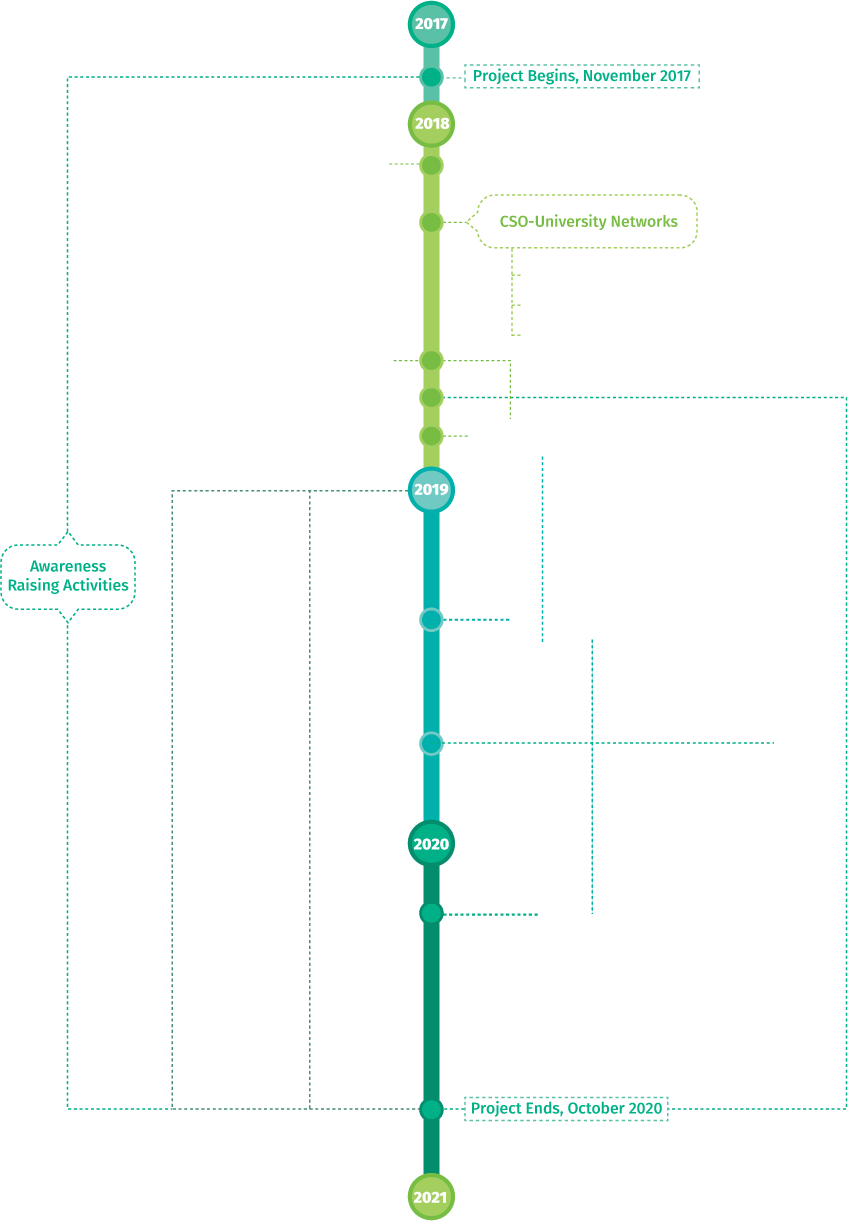

Audit on migration, sustainability
and development education
Investigation of gaps, needs and expectations from target groups and stakeholders, in shifting public perceptions of (in) security and risk, and influencing understanding of migration, sustainable development and lifestyles in an interdependent world at national, regional and European level. The results of this audit are available in a Transnational Audit Report and an Executive Summary for decision makers.
You can download the report or the summary from the News & Outputs section!

European development education Community of Practice
The Community of Practice (CoP) will provide a venue for all interested stakeholders to receive and give support, exchange ideas, learn and discuss issues relating to the design, development and implementation of the program in all partner countries and at EU level– involving all relevant stakeholders.
Visit the dedicated section of the CoP network and get involved!

Mentor partnerships between teacher training institutions
The mentor partnerships between partner countries will regularly meet virtually with collaborated teachers training institutions, to primarily support the development and integration of the Training Package in the normal activities of the institutions and the provision of training to teachers’ training and teachers.
Visit the News & Outputs section to find out more about the mentor partnerships’ strategy!

National networks for the promotion of
Policy Coherence for Development (PCD)
PCD aims at “minimising contradictions and building synergies between different EU policies to benefit developing countries and increase the effectiveness of development cooperation.” (EC on PCD, 2016). The networks promote cooperation models between various actors and advocate and lobby at the national and regional authorities on the importance for the promotion of such a policy.
Visit the dedicated section of the National PCD networks and find out more about their work!

Training Package for development
education teacher training
Visit the Training Package section and attend the online modules (e-Learning) or download the full package!

International Teacher Trainers’ Training
Selected trainers from all partners’ countries will attend trainings to specialize in participatory educational methodologies (Philosophy for Children, Theatre for Living, Open Spaces for Dialogue and Enquiry). This activity is reserved only for trainers from the project partner organizations.

National Teacher Trainers’ Training
52 national trainings will be delivered by the trained trainers from the 13 partner organizations in their countries to teacher trainers from CSOs, universities, public institutions and local educational authorities, based on the Training Package.
For more information visit the News & Outputs section or contact the partner organization in your country directly! section!

Annual International Conferences on Policy Coherence for Development in Education
3 Annual International Conferences will take place in Lithuania, Croatia and Cyprus by October 2020. Key sections of the conference will include presentations on policies and initiative of EU in interdependencies of development, panel discussions on the SDGs progress, and networking and lobbying events.
For more information visit the News & Outputs section, follow us on social media or contact the partner organization in your country directly!

National Teachers’ Workshops
78 workshops will be delivered by the trained trainers from the 13 partner organizations in their countries to pre-service and in-service teachers, based on the Training Package. All participants who will successfully complete the workshops will receive a certificate accredited by the project partners.
For more information visit the News & Outputs section or contact the partner organization in your country directly! section!

Internships of pre-service teachers
4 pre-service teachers per partner organisation will be placed in CSOs and be engaged in their normal activities in the field, including action-based research, training activities, projects’ support, strategy building and management.
For more information visit the News & Outputs section, follow us on social media or contact the partner organization in your country directly!

Practice-oriented projects, involving CSOs,
Universities and local community
These projects aim to raise awareness on SDGs, and the interconnections of migration, development and security (e.g. photo exhibitions, film festivals, local fairs, theatrical plays, sports and environmental interventions)
For more information visit the News & Outputs section, follow us on social media or contact the partner organization in your country directly!










